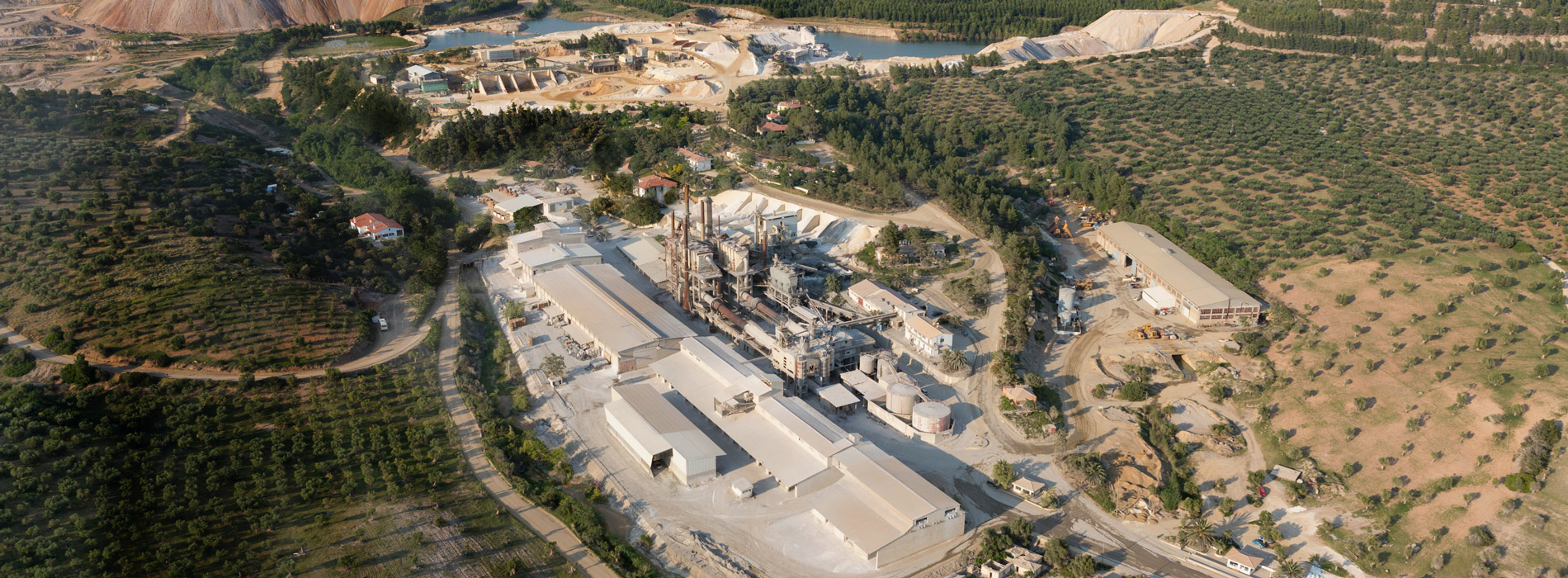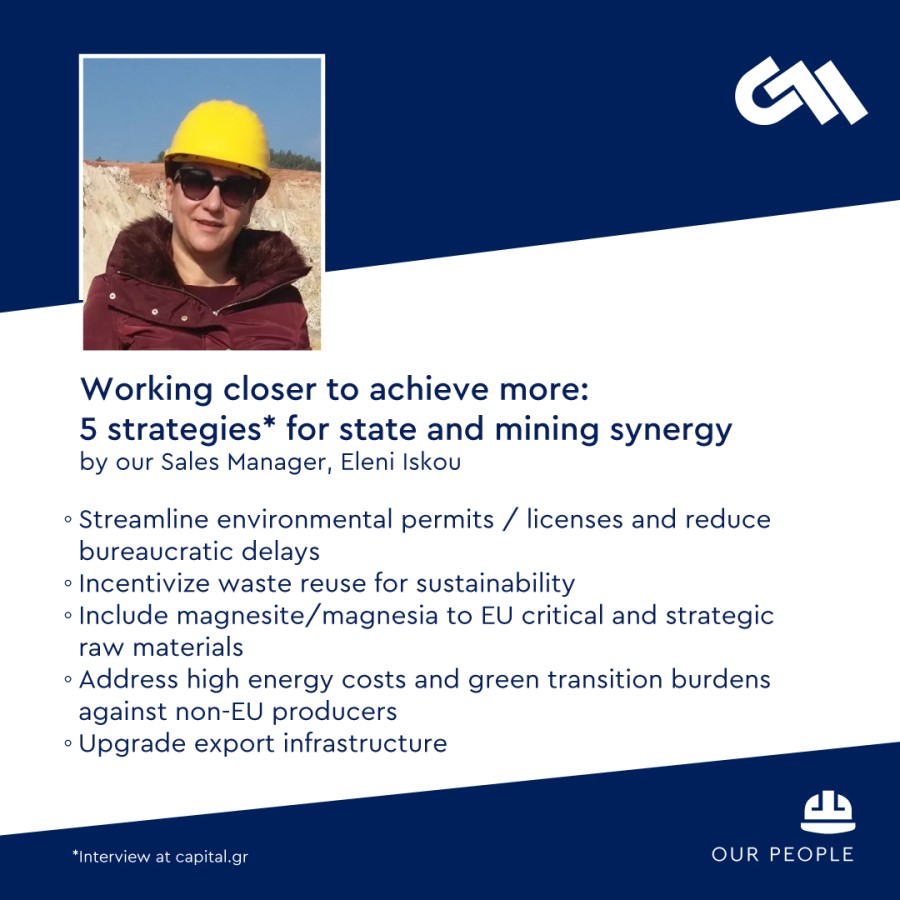
Discussing Sustainability and Growth in the Mining Sector with Capital.gr
Discussing Sustainability and Growth in the Mining Sector with Capital.gr
In a recent interview with the leading Greek business news platform capital.gr, our Sales Manager Specialties, Eleni Iskou, shared 5 key proposals to enhance productivity, reduce environmental impact, and drive sustainable growth in the mining industry. She discussed Grecian Magnesite's innovative efforts in circular economy practices, investments in green technologies, and collaborative approaches to address sector challenges like energy costs and regulatory complexities.
Read the interview here:
With 65 years of operational activity, what are the indicators of growth – production volumes, revenue, exports, and employment – that Grecian Magnesite has achieved?
Grecian Magnesite is a private company owned by the Portolos family, founded in 1959. The company operates exclusively in the mining and processing sector, focusing on the extraction, beneficiation, and calcination of magnesite. It produces and markets magnesium oxide (Caustic and Dead Burned Magnesia), refractory masses, specialty powders for electrical applications, raw magnesite and Dunite.
Its main deposits and facilities are located in Northern Greece, in Yerakini, Chalkidiki, and Eskişehir, northwestern Türkiye. The company also operates a vertically integrated production unit for refractory masses and specialized end-products in Kalyves, Chalkidiki, a green magnesite mine in Evia, a modern Research Center near Thessaloniki, and headquarters in Athens and Istanbul.
The nominal production capacity of the company in Greece and Türkiye for caustic and dead-burned magnesia is approximately 200.000 metric tons per year, and for refractory masses, 60.000 metric tons per year. By the first quarter of 2025, the company’s new rotary kiln in Turkey, with an annual production capacity of 30.000 metric tons (caustic and dead-burned magnesia), is expected to commence operation, raising the total capacity to 230.000 metric tons per year.
In 2023, the consolidated turnover of the company (including its 100% Turkish subsidiary, Akdeniz Mineral Kaynaklari A.S.) amounted to €58,2 million. Almost 93% of the production is exported to more than 70 countries worldwide. The company employs 477 people (315 in Greece and 162 in Türkiye), offering modern benefits and health and safety programs for its staff while implementing corporate social responsibility actions at the local level.
How is the network of mining, ore beneficiation, and waste management organized?
Magnesite mining takes place in three main locations: Yerakini (Greece), Eskişehir (Türkiye), and Northern Evia (Greece).
In Yerakini and Eskişehir, mining is performed using open-pit methods with benches, comprising three main phases: drilling, blasting, and loading of the run-of-mine ore. The ore is transported to crushing and screening units and then undergoes beneficiation, where state-of-the-art sorting equipment featuring high-resolution cameras (RGB Cameras) and XRT (X-ray Transmission) sensors are employed to remove the gangue material. The process concludes with calcination, where the beneficiated ore is calcined and converted into magnesium oxide, followed by final processing and packaging.
In Northern Evia, the company operates Europe’s first fully green/electric underground mine. Here, mining is conducted underground with zero-emission equipment, as all machinery is electrically powered. The mining method involves the development of each magnesite vein on successive horizontal levels, with backfilling of voids using gangue materials.
The company employs mining and separation methods for magnesite that are entirely non-toxic and pose no risk to humans or the environment. The generated mining waste, such as gangue materials and sludge, is inert. Gangue materials are deposited in controlled stockpiles for future rehabilitation, while sludge is safely stored in specially designed basins in compliance with regulations. Efforts are ongoing to convert a significant portion of gangue materials and mining waste into marketable products for the steel industry, construction, and environmental applications (e.g., CO₂ sequestration).
The company rehabilitates disturbed areas following the "spoil-to-soil" philosophy with three main techniques: reshaping, soil covering, and reforestation. To date, over 124.000 trees, shrubs, and saplings have been planted. Wastewater from ore washing is treated naturally in conventional settling tanks, and 90% of the water consumed is reused.
The company invests in energy efficiency, replacing conventional fuels with biomass wherever possible, and employs desulfurization technologies along with electrostatic separators and filters to capture dust emissions. The collected dust is transformed into a marketable product through pelletizing processes.
The company systematically manages non-mining waste and ensures a clean and safe working environment for employees.
What are the reserves of the deposits utilized by the company? Is there interest in new mining ventures in Greece or abroad?
The company holds and manages significant mining concessions in Yerakini, Evia, and Eskişehir, Türkiye, covering a total area of 80 km², with an additional 16 km² of reserve concessions available for future utilization. Confirmed reserves exceed 28 million tons of kiln feed magnesite, ensuring sustainable and long-term production. Annual production of kiln feed magnesite has ranged between 400.000–450.000 tons in recent years.
There is always interest in exploring new mining opportunities both within Greece and abroad. However, the company’s existing mining potential is highly significant, and its focus is on the continuous and efficient exploitation of these resources using the most sustainable practices.
A characteristic example of this approach is the utilization of fine materials (-20 mm) from old stockpiles, which exceed 50 million tons and were previously considered mining waste due to the lack of advanced processing technology. Today, using modern processing technologies, such as the advanced sorters mentioned earlier, high-quality magnesite is recovered, promoting circular economy principles and reducing the need for new mining activities. This approach maximizes the use of natural resources while simultaneously contributing to environmental protection.
How is the investment program being implemented by the company, with completion expected by 2025, and what does it specifically entail?
The company’s investment program, with a total budget of €9,7 million, is the first to be funded by Greece’s Recovery and Resilience Facility (RRF). Its objectives are sustainable development, energy efficiency, and productivity optimization.
The investment program includes a series of actions and investments, such as the development of the green underground mine in Evia with electric-powered equipment, intensive utilization of the old fine RoM stockpiles, and the use of biomass in the company’s kilns to reduce the carbon footprint.
It also includes measures to improve energy efficiency, replace vehicles with electric ones, and install photovoltaic parks with a capacity of 1,5 MW. Additionally, plans involve automating bagging, palletizing, and crushing systems, as well as upgrading digital equipment and networking for integrated production management and customer relationship handling.
In parallel, and beyond the investment program, significant investments have been completed or are underway. These include the construction of a new rotary kiln in Türkiye, with a CAPEX of €7,5 million, the installation of a 0,5 MW rooftop photovoltaic system in Türkiye, the establishment of a new pilot CO₂ capture unit as part of the European ConCenCUS program, and the development of a new business activity for the processing and promotion of Dunite (Olidun), which was previously considered mining waste. Furthermore, an investment in a station and infrastructure for the use of liquefied natural gas (LNG) in the company’s kilns, combined with biomass, is also planned.
What does sustainability and circularity mean for Grecian Magnesite in the mining industry?
Sustainability is an integral part of our corporate culture. Our goal is the continuous reduction of our environmental footprint and the optimal utilization of natural resources.
Our investments in low-carbon technologies, such as the use of biomass in the production process, have already resulted in a 36% reduction in fuel-related CO₂ emissions. Specifically, fuel-related emissions decreased from 103.994 tons in 2021 to 100.335 tons in 2022, 74.783 tons in 2023, and are expected to reach 66.053 tons in 2024. Furthermore, the gradual transition to natural gas usage is expected to contribute to further reductions in CO₂ emissions.
We actively promote the circular economy through the reuse of materials and the modernization of our production facilities. A characteristic example of this approach, as previously mentioned, is the utilization of old stockpiles, the recovery of Dunite, and the valorization of generated dust, among others.
How could the Greek State contribute more to the development of the sector, always considering the social and environmental dimensions of its activities?
The Greek State can effectively support the sector and the company through:
- Simplifying and accelerating environmental permits and other types of authorizations, such as installation and operation licenses.
- Encouraging and supporting businesses in transitioning to the circular economy. One of the key pillars of sustainable development is the utilization of mining waste and the adjustment of lease/fee regimes for products derived from processing such waste. In this context, a special reduced lease/fee regime for the sale of mining products produced from mining waste has been proposed, thus promoting the circular economy and the goal of zero waste.
- Supporting the efforts of European producers of magnesite/magnesia to include these products in the EU’s strategic and critical raw materials.
- Addressing high energy costs, which are significantly above the average of competitors both within and outside the EU. Moreover, the "cost" of the green transition, which burdens Greek production, does not affect competitors in third countries, such as China, Brazil, Saudi Arabia, and Turkey, making Greek producers less competitive on a global scale.
- Upgrading infrastructure, particularly at the port of Nea Moudania, where 60% of the company’s operations are handled. Extending and deepening the pier, as well as installing lighting to extend operational hours, would enhance exports and benefit not only the company but also the broader region of Central Macedonia. Additionally, strengthening the Thessaloniki port with direct routes to Northern Europe, America, and India, without requiring transshipment in Piraeus port, is of critical importance. This would reduce freight costs and ensure the availability of empty containers. Furthermore, the Thessaloniki port must proceed with the investments it has committed to, ensuring that continuous increases in local port charges are matched by improved services.
All these interventions would further boost economic activity in the region.
